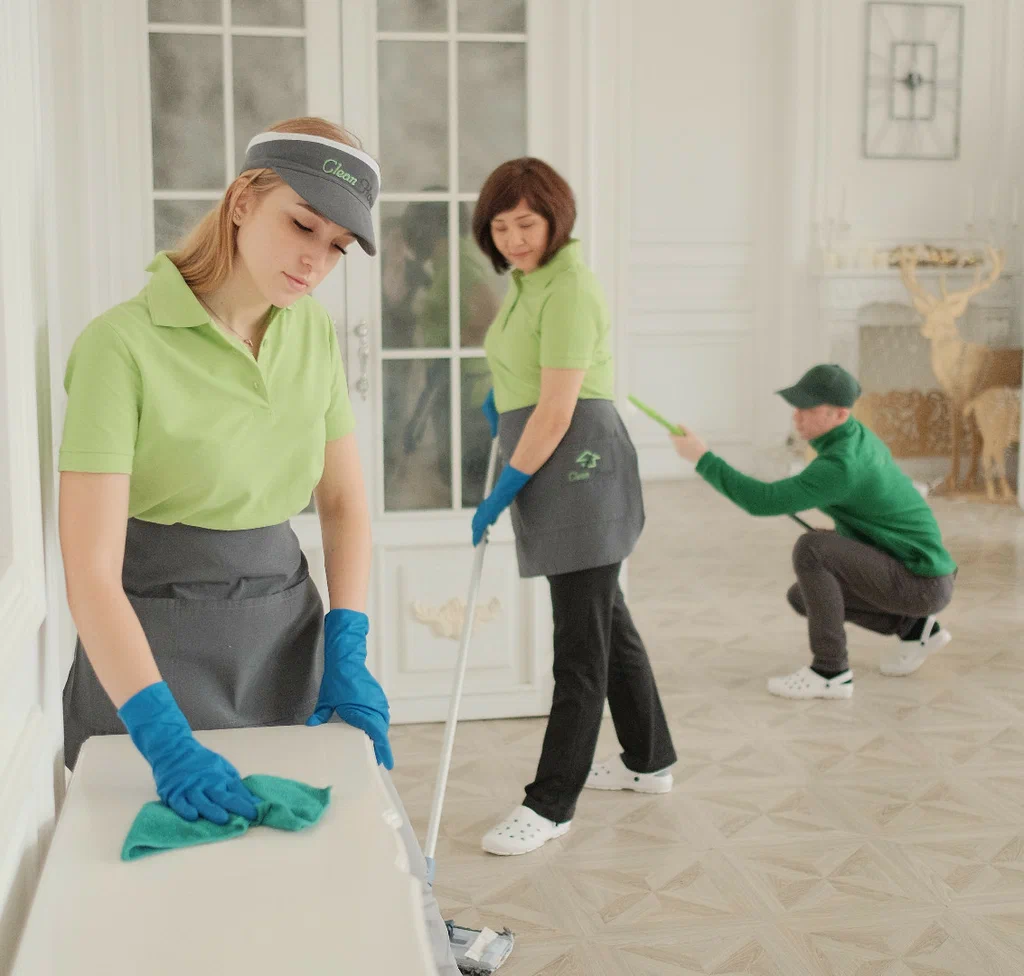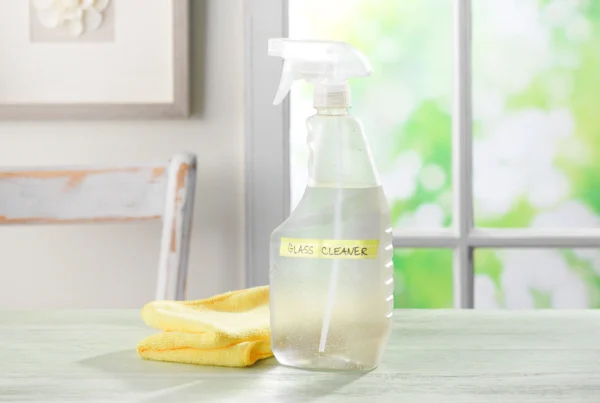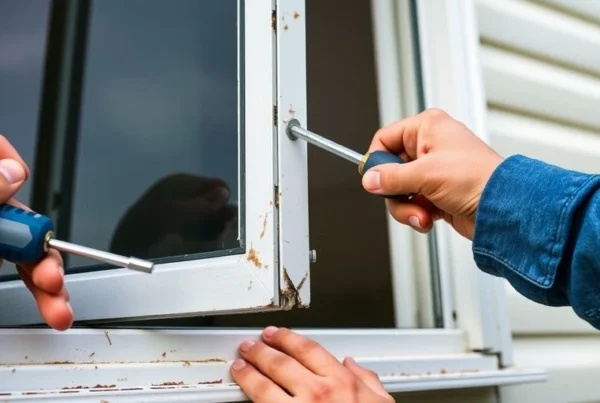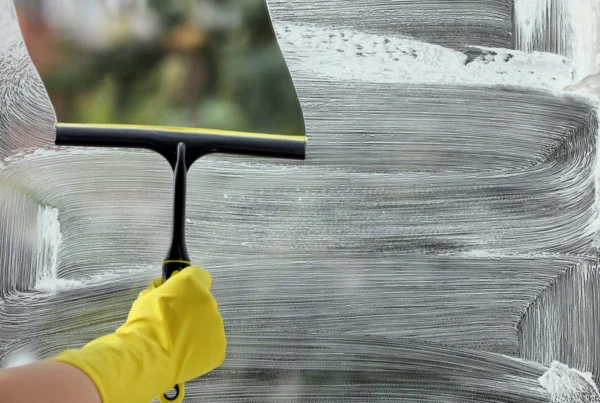Got Cloudy Windows? Here’s How to Remove Water Stains for Good
Water-stained windows aren’t just an eyesore; they can actually block your view, reduce natural light, and even pose safety risks when on vehicle glass. These cloudy, chalky white spots are caused by hard water, water high in minerals like calcium and magnesium. When water evaporates from your windows, it leaves those minerals behind, creating visible buildup that gets worse over time. Thankfully, there are simple and effective ways to get rid of these stains using household ingredients or commercial cleaners. How to clean water-stained windows? That’s what we’re diving into. We’ll walk you through proven methods and share tips to prevent the stains from coming back. And if you’re tired of scrubbing and still not seeing results, ProClean’s House Cleaning Surrey team is here to help with professional window cleaning that gets the job done right the first time.
Common Causes of Hard Water Stains
Hard water stains don’t show up by accidentthey’re usually caused by repeated exposure to mineral-rich water. If you’re noticing recurring buildup, one or more of the following may be to blame:
- Sprinklers: Outdoor irrigation systems often spray water directly onto windows, leaving mineral spots behind.
- Leaky gutters: Poor drainage can cause roof runoff to streak down your glass during rainstorms.
- Humidity and condensation: In humid climates, moisture lingers and evaporates slowly, increasing the chance of stains.
- Inadequate drying: Washing windows without drying them leaves them vulnerable to spotting.
- Lack of protective coatings: Some modern windows have built-in treatments that repel water. If yours don’t, the glass is more prone to mineral buildup.
By addressing these causes, you’ll reduce the frequency and severity of hard water stains and protect your windows long-term.
How to Clean Water Stained Windows?
Before applying any cleaning method, it’s essential to remove basic surface dirt. Wash your windows with warm water and mild soap, then rinse and dry. This ensures the stain removal method can target the mineral buildup directly. Depending on how deep and old the stains are, you may need to repeat the process or use a combination of techniques. Let’s look at some of the most effective ways to remove those cloudy spots.
Popular Methods for Removing Hard Water Stains
1. Vinegar and Water Solution
This classic method is a go-to for many homeowners, and for good reason. The acidity of white vinegar helps dissolve mineral deposits naturally.
How to use it:
- Mix equal parts white vinegar and water in a spray bottle.
- Spray the affected area generously. Focus on areas with visible buildup.
- Let the solution sit for 2–3 minutes. If it dries too quickly, re-spray.
- Use a soft cloth to wipe the glass in gentle circular motions.
- Repeat as needed and finish by drying with a clean microfiber towel or paper.
This solution is especially effective on light or recently formed stains.
2. Lemon Juice Solution
Don’t have vinegar on hand? Lemon juice works in much the same way. The citric acid in lemons naturally breaks down hard water deposits.
How to use it:
- Mix lemon juice and water in a spray bottle.
- Spray it on the affected areas and let it sit for several minutes.
- Wipe the window clean with a soft cloth.
- For a sparkling finish, use a glass cleaner and wipe with newspaper.
Like vinegar, lemon juice works best on fresh stains and leaves a pleasant scent.
3. Baking Soda Paste
When vinegar or lemon juice isn’t strong enough, it’s time to bring in a gentle abrasive, baking soda.
How to use it:
- Mix baking soda with a small amount of water to create a thick paste.
- Apply the paste to the stained areas of the window.
- Let it sit for a few minutes, giving the paste time to break down the minerals.
- Use a dry, soft cloth to scrub the glass in small circles.
- Rinse with water, then use a glass cleaner and newspaper to remove any remaining residue.
This method is a bit messier but very effective for stubborn, older stains.
4. Store-Bought Hard Water Stain Removers
There are many commercial products specifically designed to tackle hard water stains. These are formulated to break down mineral deposits quickly and may save you time if household methods aren’t working.
How to use them:
- Read the label and follow the product instructions carefully.
- Apply to the glass as directedusually with a cloth, sponge, or spray.
- Allow it to sit for the recommended time.
- Rinse thoroughly and wipe dry with a clean microfiber cloth or newspaper to avoid streaking.
While not always natural, these cleaners can be a reliable backup for heavy-duty cleaning.
5. White Wine (Alternative Method)
It might sound unusual, but white wine can also break down mineral deposits.
How to use it:
- Soak a cloth with a small amount of white wine.
- Rub it onto the stained glass.
- Let it sit for a couple of minutes.
- Wipe away and follow with regular glass cleaner for a clear finish.
This is more of a creative hack than a primary solution, but it may help in a pinch.
What Is the Best Water Stain Remover?
The best water stain remover depends on how serious the stains are and what you’re comfortable using:
- For light or fresh stains: Vinegar or lemon juice is affordable, effective, and eco-friendly.
- For moderate stains: Baking soda offers just enough abrasion to break up mineral deposits without scratching glass.
- For tough or long-standing stains: Commercial cleaners may be your best bet. Look for products labeled for use on glass.
- To prevent future stains: Apply a rain-repellent product, carnauba wax, or a glass sealant to make water roll off instead of beading up.
When to Hire a Professional
Even with the best techniques, some stains won’t budge. And if your exterior windows are high or hard to access, safety becomes a concern.
You should consider hiring a professional if:
- Stains remain after multiple treatments
- The windows are scratched or damaged
- You lack the proper tools or ladders for outdoor cleaning
- You want a spotless, streak-free finish without the hassle
ProClean offers expert residential and commercial window cleaning services that cut through buildup and restore your windows to a like-new shine.
Tips for Preventing Hard Water Stains
Prevention is the key to avoiding the frustration of repeated cleanings. Here’s how to stay ahead of the problem:
- Dry your windows after every cleaning or rainstorm with a microfiber towel
- Redirect sprinklers so they don’t hit windows directly
- Fix leaky gutters to avoid runoff from rooflines
- Apply water-repellent treatments to your windows regularly
- Clean your windows at least twice a month if you live in a hard water area
A little maintenance goes a long way toward keeping your view clear and your windows lasting longer.
Final Thoughts
Hard water stains may be common, but they’re not unbeatable. With the right approachwhether that’s vinegar, baking soda, or a professional-grade cleaneryou can bring your windows back to life. And if you’re short on time or energy, ProClean is just a call away.
Want Your Windows To Sparkle Without The Stress?
Let ProClean handle the tough stains while you sit back and enjoy the view.
Our trained professionals use safe, effective methods to restore glass surfaces, inside and out.
No ladders, no harsh chemicals, no wasted timejust streak-free, crystal-clear windows.
Contact ProClean today and see the difference for yourself!
Follow us on our socials here:
Find out more articles that can help you below:





